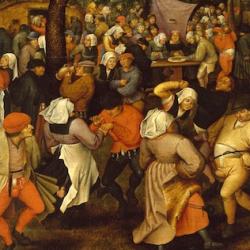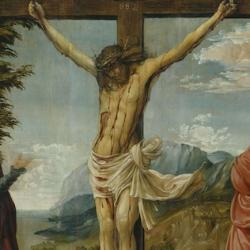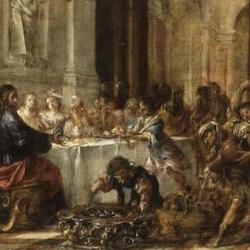Much of the following wedding sermon was inspired by Eugene Peterson’s recent Christ Plays In Ten Thousand Places .
I read from the first chapter of John’s First Epistle.
What was from the beginning, what we have heard, what we have seen with our eyes, what we have looked at and touched with our hands, concerning the Word of Life— and the life was manifested, and we have seen and testify and proclaim to you the eternal life, which was with the Father and was manifested to us— what we have seen and heard we proclaim to you also, so that you too may have fellowship with us; and indeed our fellowship is with the Father, and with His Son Jesus Christ.
These things we write, so that our joy may be made complete. God Is Light. This is the message we have heard from Him and announce to you, that God is Light, and in Him there is no darkness at all. If we say that we have fellowship with Him and yet walk in the darkness, we lie and do not practice the truth; but if we walk in the Light as He Himself is in the Light, we have fellowship with one another, and the blood of Jesus His Son cleanses us from all sin. If we say that we have no sin, we are deceiving ourselves and the truth is not in us. If we confess our sins, He is faithful and righteous to forgive us our sins and to cleanse us from all unrighteousness. If we say that we have not sinned, we make Him a liar and His word is not in us.
Let Us Pray.
Almighty God, our Father, You are light and in You there is no darkness or shadow of turning. You have called us to walk in the light, having fellowship with You and with one another. Fill us with the joy and wisdom and beauty of Your Spirit, we pray, as we consider Your word today, through Jesus Christ Your Son, our Lord, who lives and reigns with You and with the Holy Spirit, ever one God, to ages of ages. Amen.
Philosophers have measur’d mountains,
Fathom’d the depths of seas, of states, and kings;
Walk’d with a staffe to heav’n, and traced fountains;
But there are two vast, spacious things,
The which to measure it doth more behove,
Yet few there are that sound them, – Sinne and Love.
In the beginning it was not so. In the beginning there was only love, the love of Father, Son, and Spirit purely manifested in the harmonies and beauties and sheer very-goodness of the original creation. In the beginning, there was Adam and Eve, bone of bone and flesh of flesh, the woman taken from man and the man loving his bride with the divine love that created the world. God created humanity to embark on an adventure of Love that would stretch through age after age, an eternal exploration of ever-new dimensions of God’s love and ever-fresh responses to it. In the beginning there was only the consonance of love, and humanity would have sounded and measured love forever.
But since Adam sinned, it has been just as George Herbert wrote: there are two “vast, spacious things” that must be measured, and there are few able to sound them. Since Adam sinned, there has not been only love; there has often been little love, and what little love there has been has often been swaddled in sin. Since Adam sinned, man is embarked on a double adventure, not only an exploration of love but an exploration of sin, an adventure of love in a world of sin, a pursuit of consonance in a world marred by dissonance. And these two courses of study – the study of love and the study of sin – are inseparable.
John’s first epistle is addressed to a community of believers called to walk in light and love within a world of darkness, hate, and sin. He’s blunt about the sins that exist within the church herself. Those who “say that we have fellowship with Him yet walk in darkness,” he says, are liars (1:6). Whoever says he is in the light and “hates his brother is in the darkness until now” (2:9), and whoever hates is a murderer (3:15). Whoever practices sin is “of the devil,” following the example of his father (3:8). Some simply refuse to love their brothers (3:10), some are murderous like Cain (3:12), some ignore the needs of others (3:17), many are self-deceived (1:6).
In the beginning it was not so. But now it is, universally. John’s church of liars and haters, of the hard-hearted and the self-deceived, of diabolical Cains is not a unique exception in the history of the church. In one degree or another, it describes every church that has ever existed. As Eugene Peterson has written, “Christian communities, all of them, are communities-in-progress, baptized sinners in various stages of development in the life of love. Men and women are not admitted to the community by presenting credentials of love skills, nor do we maintain our place in the community by passing periodic peer reviews on love. We are here to be formed over our lifetimes into a community of the beloved.”
All that John says about the cultivation of love applies quite directly to marriage, that most fundamental of human communities. Because all are sinners and all sin, marriages are as prone to deception and self-deception, hatred and harshness, darkness and devilishness as any other community. You are being called today to an adventure of love in that context, and the Apostle John’s instructions to the church are highly relevant to you as you strive to make a success of your marriage.
There is much to say here, but let me point to three things. First, if you want to succeed in your pilgrimage of love, you need to be ready to confess your sins and forgive one another. If you refuse, John says, you are a liar, and marriages founded on lies do not endure. The world around us encourages precisely this kind of lying. We are free to blame everyone and everything for our sins: Our parents were too strict, our parents were too lenient; I have too much education, I have too little; I am poor, I am rich; my siblings tortured me, my siblings coddled me. A marriage based on truth must be a marriage characterized by regular admission and confession of sin, because it will, inevitably, be a marriage characterized by regular sin.
Scripture doesn’t simply teach us, as the hippies used to say, to “let it all hang out.” Confession is not venting for the sake of venting. Confession is truth-telling, and it’s designed to lead to forgiveness and reconciliation. Sin is always an offense against a person, never merely a violation of a rule; it is always an offense against God, and usually an offense against one or more human beings. Sin is a breach of fellowship, a breach of community, a wound of the social body that can only be repaired by the medicine of reconciliation. Confession is necessary to repair this wound to fellowship on the basis of truth.
Again, the world offers us all kinds of clinically tested substitutes – therapies that will enable us to cope, therapies that promise to ameliorate the effects of sin, therapies that do everything but heal. The only thing that really deals with sin is forgiveness, and the only basis for real forgiveness is the death and resurrection of Jesus. This too John hammers again and again: “The blood of Jesus Christ cleanses us from all sin” (1:7); “If we confess our sins, he is faithful and just to forgive us our sins and to cleanse us from all unrighteousness” (1:9); “If anyone does sin, we have an advocate with the Father, Jesus Christ the righteous; and He is the expiation for our sins, and not for ours only but also for the sins of the whole world” (2:1-2). You will sin against one another, frequently. But you will be equipped to sound out the vast and spacious thing that is love if you practice honest and open confession and offer ready and full forgiveness.
Second, remember the incarnation of the Word. John begins his l
etter talking about the incarnation in some of the most beautiful lines in the New Testament. The Word of Life, Life itself, has been made visible, audible, tangible, and this manifestation has been proclaimed so that we might have fellowship with one another and together have fellowship with the living Triune God.
How does this work? Ultimately, we have fellowship with one another because the Triune God has in Christ caught us up together into His fellowship. But the incarnation of the Word is also a constant reminder of the demands of love in communities, and marriages, marked by sin. You’re not promising to hold to some spiritual principle, but to love a particular man and a particular woman. Peterson again: “a dehumanized Jesus is a lot easier and more pleasant to love than a difficult spouse, or an angry teenager, or a rude neighbor, or an insufferably boring brother-in-law – all of them so very, very human.” Remembering the incarnation of the Son is a constant reminder that in marriage you are not called to love disembodied principles but a person, a flawed person, your spouse.
Third, community, including the community of marriage, is a remedy for sin. For John, community is not only the site where sin takes hold and does its damage, but is also, by grace, part of the solution to sin and the undoing of its damage. It is in community that we hear Incarnate Life proclaimed, in community that we abide in love and light, in community that we confess our sins and hear the declaration of forgiveness. The church is the place of sickness, but it is also the hospital.
All the old liturgies and manuals on marriage claim that marriage in particular is a remedy for sin, particularly for lust. This now sounds quaint and sentimental. It should not. As Robert Farrar Capon has said, “We don’t talk much any more about lust as a disease. We don’t see ourselves imperiled by fornication; instead we name it Sex and praise it to the skies; but a disease it is nonetheless, and marrying remains the cure. Sex teaches me to desire all women above a very low passing grade. Marriage gives me only one. If it’s Sex I’m after, the conjugal bed is not much of an improvement on celibacy.” But, if it’s health that we seek, and correction on an adventure of love, then marriage is precisely the remedy offered by Great Physician of our souls. And not only for lust, but for all the petty selfishnesses, impatiences, angers and other sins that inhibit our live. Marriage is not easy or quick therapy, but it is therapy.
We began with Herbert, and so let us end, with the final stanzas of the same poem, “The Agonie,” where Herbert identifies the single source that enables us to measure both Sinne and Love, and to triumph in our adventure of Love in the world of Sinne. That single source is Jesus. If you would sound and measure Sinne and Love, strive above all to know Jesus.
Who would know Sinne, let him repair
Unto Mount Olivet; there shall he see
A Man so wrung with pains, that all His hair,
His skinne, His garments bloudie be.
Sinne is that presse and vice, which forceth pain
To hunt his cruell food through ev’ry vein.
Who knows not Love, let him assay
And taste that juice which, on the cross, a pike
Did set again abroach; then let him say
If ever he did taste the like.
Love is that liquor sweet and most divine,
Which my God feels as bloud, but I as wine.











